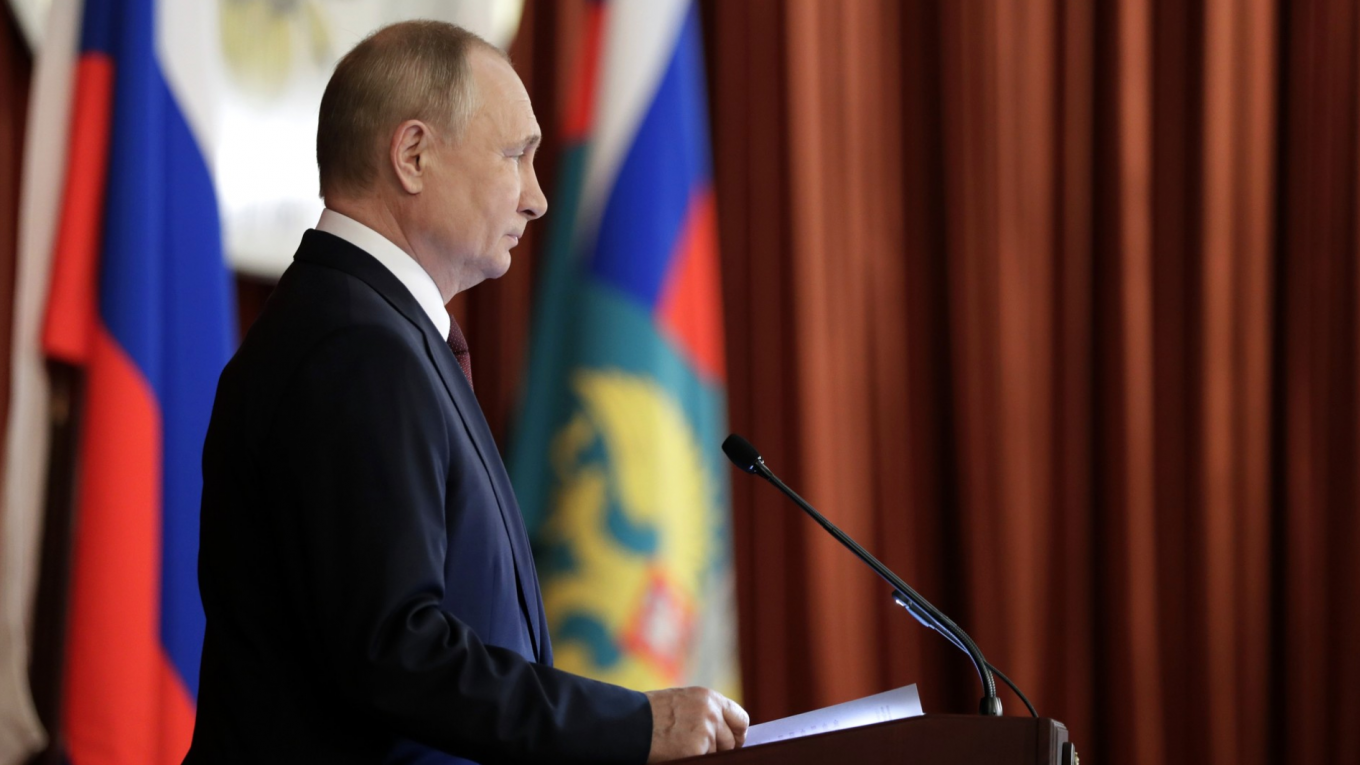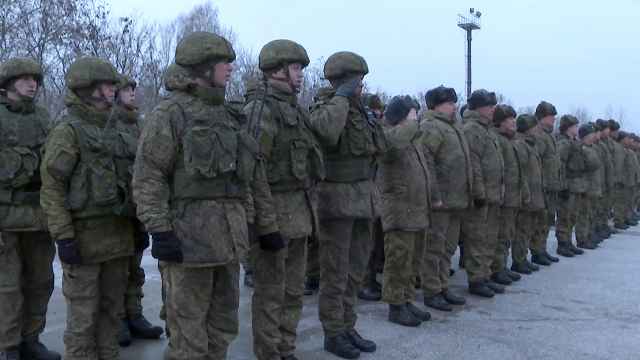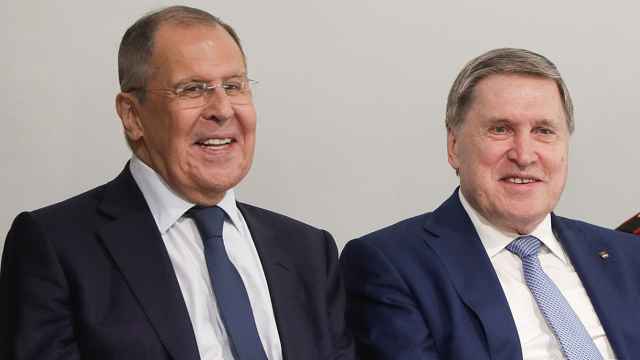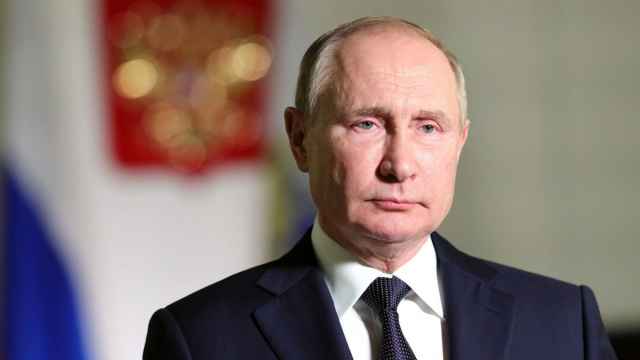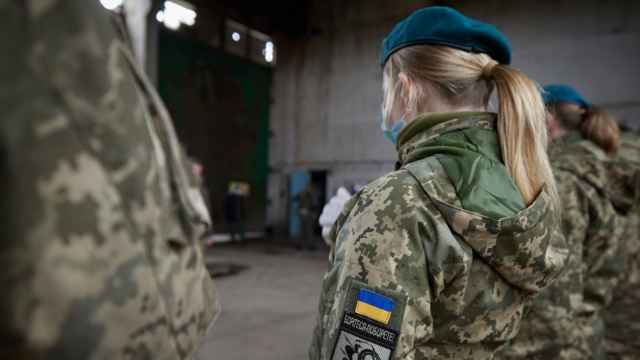Russian President Vladimir Putin on Thursday said the West is "escalating" the Ukraine conflict by holding drills in the Black Sea and flying bombers near its borders.
His comments come as the U.S. accuses Moscow of a troop build-up near Ukraine.
Western countries have for days raised alarm over Russian military activity near Ukraine, with Washington warning Moscow against making another "serious mistake" in the ex-Soviet country.
"(Our) Western partners are escalating the situation by supplying Kiev with lethal modern weapons and conducting provocative maneuvers in the Black Sea," Putin said in a speech to the Foreign Ministry.
He claimed that Western bombers are flying "20 kilometers from our border."
The longtime Russian leader said Moscow has been "constantly raising concerns about this" but "all our warnings and talk about red lines are treated superficially."
Putin has been voicing concern about U.S. naval exercises in the Black Sea for days, telling his French counterpart this week that they were "provocative" and leading to "increasing tensions" between Moscow and NATO.
He has also slammed Ukraine for using a Turkish-made drone against pro-Moscow rebels.
The Black Sea is a sensitive region for Russia, which controls the Crimea peninsula after annexing it from Ukraine in 2014.
Since then, Kiev has fought a conflict with pro-Russia rebels in the east of the country which has claimed more than 13,000 lives.
Russia as 'culprit of all problems'
Renewed Western speculation about Russia's plans in eastern Ukraine have come amid a clash over an unexpected migrant crisis on the border with Kremlin-aligned Belarus and EU member Poland.
The EU has accused the Kremlin-backed regime of Alexander Lukashenko in Belarus of purposefully luring thousands of migrants — mostly from the Middle-East — to its doorstep as revenge for sanctions.
Some in the EU, including Poland, have said that Moscow is also behind the crisis.
"Brussels needs to understand that the decreasing of military-political tensions is not only in Russian interests, but in those of the whole of Europe, and even the world," Putin said.
Earlier on Thursday, the Kremlin said Europe should not blame Russia for "all problems."
"Russia has an interest in everybody in Europe finally coming to their senses and stopping considering Russia the culprit of all problems," Kremlin spokesman Dmitry Peskov told reporters.
He added that Europe should instead "address the primary sources of the problems that are currently suffocating Europe."
Peskov's remarks come after British Prime Minister Boris Johnson on Wednesday warned Russia against any "military adventurism" on the borders of Ukraine and EU member Poland.
"Recently there have been a lot of hysterical publications in Britain," Peskov said.
"Russia is not waging any hybrid wars," he added.
Ukraine seeks more Western arms
Russia had carried out large-scale drills near the Ukraine border and in annexed Crimea in the spring, sparking concerns of a possible invasion.
Kiev, which in recent weeks downplayed the scale of Russia's presence at its borders, on Thursday said it was seeking more military aid from the West.
Videos circulated recently on social media have shown Russia moving troops, tanks and missiles towards the Ukrainian border.
"Russia's aggressiveness, both diplomatic and military, has increased considerably in recent weeks," Ukraine's Foreign Minister Dmytro Kuleba told a press briefing.
The minister said that after his visits to Washington and Brussels "work is under way to develop a comprehensive package for the containment of Russia."
He added that Kiev is in negotiations with the West for "the supply of additional defense weapons for our army."
Moscow, in turn, has accused Kiev and the West of warmongering.
This week, France's Macron told Putin that Paris was ready to defend Ukraine's territorial integrity, according to the Elysee.
A Message from The Moscow Times:
Dear readers,
We are facing unprecedented challenges. Russia's Prosecutor General's Office has designated The Moscow Times as an "undesirable" organization, criminalizing our work and putting our staff at risk of prosecution. This follows our earlier unjust labeling as a "foreign agent."
These actions are direct attempts to silence independent journalism in Russia. The authorities claim our work "discredits the decisions of the Russian leadership." We see things differently: we strive to provide accurate, unbiased reporting on Russia.
We, the journalists of The Moscow Times, refuse to be silenced. But to continue our work, we need your help.
Your support, no matter how small, makes a world of difference. If you can, please support us monthly starting from just $2. It's quick to set up, and every contribution makes a significant impact.
By supporting The Moscow Times, you're defending open, independent journalism in the face of repression. Thank you for standing with us.
Remind me later.


